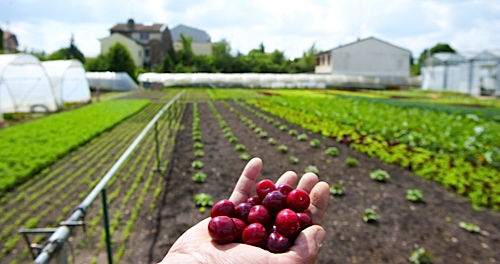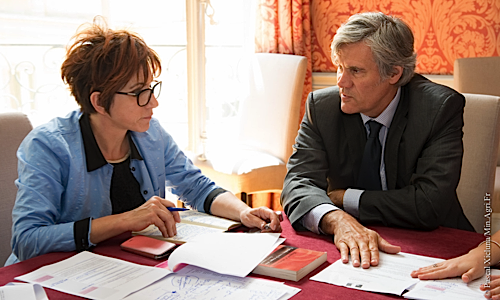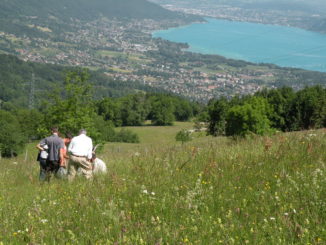A fascinating power play is emerging in France around pesticides. Some noteworthy and challenging pesticide reduction policies policies, such as Ecophyto 2, have emerged. Meanwhile, major politicians are clashing and occasionally out flanking each other. Peter Crosskey unpacks the story for us, in an exclusive article.

A number of practical measures have been put in place to implement the provisions of the French government’s pesticide reduction plan, Ecophyto 2. [Ministry statement in French] With the start of the new agricultural year in July, pesticide sellers have started a five-year trial period during which they agree to promote alternatives to chemicals.
These could include mechanical weeding equipment, bio-control products like pest predators or even pest management planning literature. Each alternative strategy comes with a value, based on the estimated saving in crop products it represents. For each one, the distributor concerned will earn a certificate to set against a five-year target figure. For every missed Certificat d’Economie de Produits Phytopharmaceutiques (CEPP) at the end of the five years, distributors will face a fine, currently set at a symbolically low five euros.
The French farm minister, Stéphane Le Foll, explained the value of this particular scheme: “It’s a tool that doesn’t weigh the farmer down, but lets the whole sector take responsibility for protecting farm workers, citizens and the environment.” On a separate occasion, the minister presented the French government’s current work on risk assessments for farm workers handling crop products. It includes:
- Gathering data on crop products and their impact on the workforce;
- Checks on protective gear used on farms;
- Requiring suppliers to improve the standard of advice they offer with their products;
- Strengthening the training given to workers spraying crop products;
- Reducing the dosage and toxicity levels of what is sprayed.

Underlying mainstream unease with agroecology message
None of the preparatory measures for this have been well received by mainstream farmers’ unions. In 2014, farmers protesting over a proposed ban on spraying near schools and other public buildings started a fire outside a local government office, damaging the building [Article in French]. The agroecology agenda was a root cause of the national farmer protests that shook France on November 4, 2014. Across the country, television news stories ran footage of farmers dumping tonnes of manure in front of regional government buildings, tipping 50 tonnes of potatoes on the streets of Paris and making wildcat border checks on foreign lorries carrying food products. [Article in French
So far as French farmers’ leader Xavier Beulin is concerned, problems with pesticides are never the fault of French farmers. In 2015, during an interview for the French public information magazine website Public Sénat, the FNSEA president wrongly accused Spanish growers of shipping lettuce with high residue levels. Beulin accused Spanish farmers of: “…not having the same standards as France.” In fact, Public Sénat explained, the samples tested had only two imported lettuces – the other twenty nine had been grown in France.
In the face of an increasingly dysfunctional and crisis-weary farming sector, Le Foll has gone out of his way to accommodate mainstream farmers. He has been arguing, until earlier this year, that farmers should have continued, if reduced, access to pesticides – including glyphosate and neonicotinoids, if needs must. Coming as he does from farming stock, he is wary of changing too much, too quickly and, as it were, scaring the horses in a deeply conservative sector.

France is Europe’s heaviest user of pesticides, with a postwar tradition of governments supporting French agriculture through thick and thin. Yet in 2016, the agricultural sector has become aware of a sea change in French public opinion on crop treatments. During the spring, environment minister Ségolène Royal launched the parliamentary debates for what has since become France’s new biodiversity law, the Loi Pour La Reconquête De La Biodiversité, De La Nature Et Des Paysages. In the process, Royal clipped the wings of Stéphane Le Foll, curbing his underlying acceptance of agricultural chemicals as a fact of rural life.
To the consternation of many French farmers, France ended up opposing an EU renewal of the glyphosate authorisation in July. Like Malta, which is committed to an outright ban, France is now considering a glyphosate ban of its own. France’s new biodiversity law will impose a neonicotinoid ban by 2020, but is flawed in its treatment of GMOs and habitat destruction.
The passing of the biodiversity law has triggered a legal challenge from Les Républicains (LR) as to whether it is constitutionally sound. LR is the new name for the Gaullists, led by former president of the French Republic, Nicolas Sarkozy.
Sarkozy, it will be remembered, started his presidential term with the Grenelle de l’environnement, a national environmental consultation and discussion process that was going to guide the new president’s environmental priorities. Unfortunately, the process outgrew the resources available to it, leaving Sarkozy wishing he’d never put the idea forward in the first place. At the Salon de l’Agriculture, later in his presidency, he inadvertently let slip the words: “…l’environnement, ça commence à bien faire…” (“…the environment is getting on my nerves…”).
LR’s main quibble with the biodiversity law is the fact that it protects itself from later removal by invoking a ratchet principle. This means that it can be improved, but the environmental protections it prescribes are sacrosanct and inviolable. LR also claims that the neonicotinoid ban infringes European regulations (not the case) and violates “the principle of freedom to do business (sic).” Which very tidily demonstrates how much the Gaullists learnt from the Grenelle de l’environnement, should anyone ever need to ask.
With barely two years of steering a new course for agriculture behind it, the Hollande presidency faces fresh presidential elections next year. The agroecology-driven loi d’avenir appeals to values beyond the mercenary monetarism of mainstream rank and file farmers; EcoPhyto 2 is still in its data-gathering stages and the biodiversity law’s proposed 2020 ban on neonicotinoids causes deep concern among sectors like sugar beet, which uses dressed seed.
François Hollande faces a bleak prospect in rural areas that have yet to benefit directly from greener policies – almost as bleak as the urban areas that have opposed the government’s changes to employment laws. Like every other incumbent, he will be judged on results, unlike his rivals, who will be judged on promises. Electors are predisposed to settle for promises if results are not clear and unambiguous.
More
How Politics and Power Play with Pesticides in France (Jan 2016)
Ecophyto 2 – France tries to halve pesticide use. Again. (Nov 2015)
New Law, Contested Agroecology – France’s Loi d’Avenir (Feb 2016)





